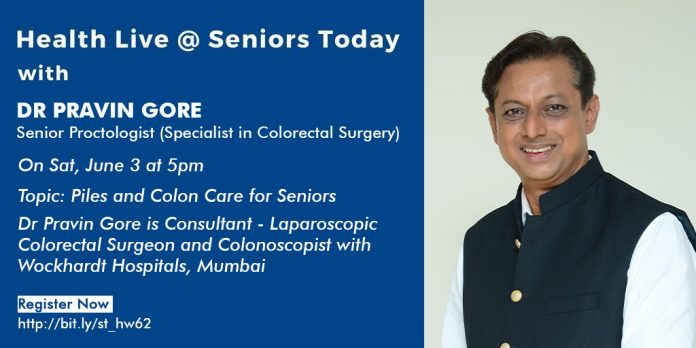On 03 June, 2023 Seniors Today hosted their weekly Health Live Webinar with Dr Pravin Gore, a Senior Proctologist, specialist in colorectal surgery who spoke on and answered questions about Piles and Colon Care for Seniors.
About Dr Pravin Gore
Dr Pravin Gore has done his MBBS and DNB in General Surgery. He did his Fellowship in Colorectal Surgery from Madhurai and an Advanced Colorectal Surgery Fellowship from Birmingham and a Laparoscopic Colorectal Surgery Training in Rome University. He has been pursuing his practice for over two decades in Mumbai. He is attached to elite hospitals such as the Wockhardt Hospitals and other hospitals. He is also an honorary member of the Department of Proctology at the GT Hospitals. He has received the prestigious Dr Abdul Kalam Azaad award for his excellence in Colorectal Surgery from the former Chief Minister of Telangana state.
Dr Gore is arguably the only surgeon in India to offer botulinum toxin as a treatment for anal fissure surgery. He has pioneered the technique of BUSH. He has been a faculty at the national and international levels and has delivered several lectures, has many publications and text book chapters in his name. He is one of the only 3 proctology specialists in Mumbai. And one among the 46 surgeons who focus on colorectal surgery.
Anorectal problems/ issues are the kinds of problems where the patients suffer behind the closed doors of their bathroom and they do not want anybody else to know about it. These patients keep silently suffering due to embarrassment and lack of knowledge of what to do and whom to consult.
Just like all fevers are not malaria and all coughs are not tuberculosis, just like that, all bottom- problems are not piles.
Piles, also known as haemorrhoids are often confused with 27 other bottom problems which can present with similar symptoms.
There are normal blood vessels that supply blood to and around the anus and are attached to the wall of the anus. Because of hard stools, constipation and forced passage of stools, there can be a tear in the walls of the anus leading to bleeding and this can also lead to loosening of the elasticity of the vessels, walls and their support.
If a patient visits his physician at an early stage, the 1st and 2nd stage of haemorrhoids, diet and lifestyle changes are enough to take care of the hemorrhoidal issues in addition to oral medication and local applicant ointments that can help with the concern.
However, if the precipitating factors such as constipation, hard stools, forceful passage of stools persists, the haemorrhoids can either return and also progress in grade and severity.
Grade 3 and grade 4 piles- which is when the haemorrhoids come out of the anus and can be reduced with a finger and sometimes they become non- reducible, is when the patient requires surgery. This is where colorectal surgery comes into play. There are bloodless ultrascopic scalpel, lasers and staplers available.
Thus, not all bottom problems are piles and not all piles require surgery. And even if you require surgery, multiple modalities are available which are tailor made for the patient and his requirements.
A balanced diet is advised as a preventable measure for haemorrhoids. Along with diet, a healthy lifestyle with a calm and stress free life, healthy sleeping habits, eating habits also play an important role.
Avoid junk food and a sedentary lifestyle.
All of this can also precipitate constipation which can further lead to haemorrhoids.
No urge to pass motions is constipation.
Incomplete passing of stools is constipation.
Hard, rocky stools are also constipation.
As age advances, the moment of our intestines also slows down. Thus, for a senior it is okay if you pass stools every 30- 32 hours instead of every 24 hours, as long as the stools are not rocky hard, or you have not passed stools in over 2 days.
Be aware of the movements of your intestines. Your stools are formed and pushed from the rectum and are passed through the anus which in coordination with the rectum opens simultaneously.
Forcing or straining is detrimental in case of a patient of constipation.
Contributory factors for constipation include:
- Age
- Diet
- Sedentary lifestyle
- Less intake of water
- Different postures
The cause of constipation needs to be located. Is it in the intestine, rectum or at the anus. Depending on this, we treat the patient.








